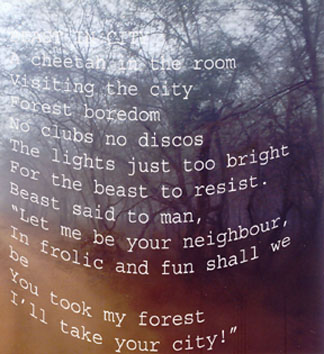The Smartest and the Fastest: Investigating the limits of nature
Charles Graham Wells
On March 11, 2001, the London Sunday Telegraph reported that geneticists at a lab in India intend to clone the Asiatic cheetah, in hope of preventing the
animal's extinction. It's nothing special, I suppose-we have presided over other clonings, and other extinctions. But I find it interesting that we, who are capable of inserting cheetah DNA into a leopard's womb, were careless enough to kill so many cheetahs
in the first place. And there is something else that struck me, something about the very fact that we are trying to bring a large carnivore back into the game. I can imagine a time when cats and men were in competition: the cats killed the same grazing ungulates
that we might have wanted, and occasionally even killed us. But now we feel safe-so insulated from the jungle world, that, having nearly eliminated a species, we are trying to revive it. It seems that in the competition between brains, and claws, and wings,
and teeth, brains have won.

It is our universal science fiction fear that mankind will create a robot which can improve itself, ultimately taking power away from us. It's funny we fear that, because in the natural
world man is that robot. Intelligence has trumped the other weapons: it is the claw that sharpens itself. But it can be more than a claw, and we can be more than destroyers. It is unclear whether we will bring the cheetah back into the world. Perhaps we can't.
But we know that even failure can be hopeful, because we will learn from our mistakes. We have to, as the cheetah has to run. There is no difference: it's the steady drive of nature.
For Full Article go to
http://www.princeton.edu/~stcweb/html/pope02essay.html
Poem “Beast in City”-Saraswati Kavula